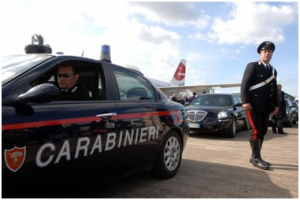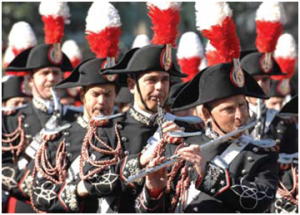The ancient Corps of the Royal Carabinieri was instituted in Turin by the King of Sardinia Vittorio Emanuele I, by Royal Warrant on 13th July 1814.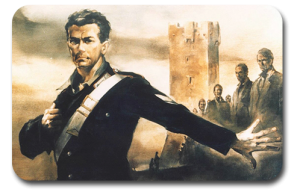
The mounted division “Corazzieri” was formed in 1868 as an escort of honour and security, first for the Sovereign, and since 1946 for the President of the Republic.
With the Unity of Italy and added territory, the number of divisions were increased and responsible to operating commands, called territorial legions. On 24th January, 1861 the Force was appointed “First Force” of thenewly founded national military organization, rising to the status of Armed Force on 31st March, 2000. This privileged position, as well as the presence of Carabinieri in every part of the country, even in the smallest village, were and still are the most significant characteristics of the Institution.
Governing Bodies
The Carabinieri Force is linked to the Ministry of Defence but retains its autonomy, in its role of Armed Force, Military Police Force, and responsibility for public order and security. The Force depends, through its Commander General, on the Defence Chief of Staff for its military duties, and functionally on the Ministry of Internal Affairs for public order and security tasks.
For the role played in the Judiciary Police, the Carabinieri report, regarding operational activities, to the relevant Legal Authority according to the penal procedure.
For operating purposes, the Force is divided into:
- Carabinieri General Headquarters
This is the central organization from where the Commander General of the Carabinieri Force manages, coordinates and controls the activities of the Force with particular emphasis on the following:
- analysis of crimes and coordination of the operations among its departments;
- liaison with Ministries, Public Administration Departments and when required with international organizations.
Decision making is concentrated on the Force Commander General and on the Chief of Staff.
- Training
The Force provides the necessary training facilities for individual and collettive preparation, ranging from basic military training to more specialized career training. The Training Schools are required to prepare participants to carry out their military and police duties to their best ability, thereby maintaining the high standards of the Institution. To achieve the above objective, the Carabinieri Training School Command controls and coordinates the training organization which consist of the following entities:
- The Carabinieri Officers’ College;
- Warrant Officers and Brigadiers (Sergeants) Training School;
- Carabinieri Cadet Training Schools.
The Italian Carabinieri Corps
The following, are examples of some of the specialist training centres which provide training in their respective sectors:
- Foreign Language Office of the Carabinieri Training School Command in Rome responsible for teaching foreign languages and the certification of required standards;
- 2nd Mobile Brigade Training Centre in Livorno which provides basic training for the selection of personnel for international missions.
- Carabinieri Shooting Training Centre in Rome for:
- Research and experimentation in weapons and equipment as well as in real combat skills;
- Develop specialization courses for shooting instructors and marksmen.
- Alpine Training Centre in Selva di Val Gardena, which provides training for skiers, rock climbers, mountain rescue workers, antiavalanche squads and preparation for representatives of the Force in winter sports competitions.
- Specialist Telematics Training Centre in Velletri.
- Carabinieri Investigative Techniques High Institute in Velletri.
- Carabinieri Scuba Centre in Genoa;
- Carabinieri Dog Handling Centre in Florence;
- Carabinieri Mounted Regiment in Rome.
The territorial Organization
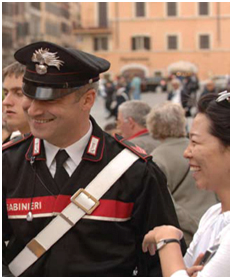 The territorial Organization is at the core of the Institution’s activities and relies on the framework of the departments, structured as follows:
The territorial Organization is at the core of the Institution’s activities and relies on the framework of the departments, structured as follows:
- 5 Inter-Regional Commands commanded by Lieutenant Generals which exercise overall control and coordination regarding regional commands and ensure, including their organizations, technical, logistic and administrative support;
- 19 Legion Commands commanded by Major and Brigadier Generals who are responsible for the coordination and the control of the activities conducted by the provincial commands;
- 102 Provincial Commands commanded by Brigadier Generals, Colonels and Lieutenant Colonels. These commands – situated in major towns of each administrative region – are responsible for an administrative province for the direction, coordination and control of dependent departments (even the specials) and for the analysis and the correlation of the operating and crime- fight activities they carry out;
- 11 Group Commands commanded by Colonels, Lieutenant Colonels, used in order to divide the functions of management, coordination and control of the Provincial Commands;
- 539 Territorial Department and Company Commands commanded by Lieutenant Colonels, Majors and Captains and structured differently in accordance with the operative importance of the territory. They organize activities in a variable number of Lieutenancies and Stations and are equipped to provide a 24 hour call out service and have the capability of operating independently in dealing with local criminal activities;
- 45 Lieutenancies commanded by First and Second Lieutenants, responsible for a single densely populated town. They are able to intervene 24 hours a day and have an autonomous judiciary policing role being directly responsible for the territory and related institutional activities;
- 4623 Carabinieri Stations. Local Carabinieri stations which, depending on their operational status, are commanded by: Warrant Officers deputizing as Public Security Officers, First and Second Class Warrant Officers. They are directly responsible for the control of the territory for one or more towns or part of a major town and their related institutional activities.
Each station adopts different opening hours for the public, depending on operational and social circumstances.
The territorial organization, can also count on the Operational Support provided by:
- Carabinieri Operating Group “Calabria”;
- “Sardinia” Heliborne Hunter Squadron;
- Squadrons Unit;
- Carabinieri Dog Handling Units;
- Carabinieri Naval Units;
- Carabinieri Scuba Units.
Mobile and specialist organization
This organization – made up of departments dedicated, in order of priority or exclusively, to particular or highly specialized tasks which can be conducted either by receiving/giving support from/to the territorial organization – reports to Carabinieri Specialist Mobile Unit Command “Palidoro” which is based in Rome and is divided into:
- Mobile Unit Division – that is responsible in a special way for military and anti-riots tasks, also concurring in Civil Protection activities – located in Treviso, on whom the following entities depend:
- 1st Mobile Brigade based in Rome which consists of 11 Battalions and includes the Carabinieri Mounted Regiment, a department inherited from the Italian cavalry tradition, well known and appreciated all over the world for its equestrian displays and competitions.
- 2nd Mobile Brigade, situated in Livorno and specialized in participating in military operations (in Italy and abroad), consisting of:
- Carabinieri Parachutists Regiment “Tuscania” located in Livorno with personnel in possession of highly specialized skills and versatility;
- 7th Carabinieri “Trentino Alto Adige” Regiment located in Laives (BZ);
- 13th Carabinieri “Friuli Venezia Giulia” Regiment located in Gorizia;
- Special Intervention Group (G.I.S.), specialized in high risk mission, e.g. interventions in cases of: hijackings, actions in presence of hostages and terrorist-guerrilla actions.
- Specialists Units Division, located in Rome, consisting of highly qualified personnel working and reporting to the competent Ministries, for the safeguard of socially sensitive issues:
- Carabinieri Healthcare Command;
- Carabinieri Environmental Care Command;
- Carabinieri Command for the Safeguard of Cultural Heritage;
- Carabinieri Command for Food and Agriculture Policies;
- Carabinieri Labour Care Command;
- Carabinieri Foreign Affairs Command, involved in the security of the Ministry of Foreign Affairs and of national overseas diplomatic representatives. Those embassies, located in areas of higher risk, are further reinforced by member of the Carabinieri Parachutists Regiment “Tuscania”.
- Carabinieri Bank of Italy Command, responsible for the security and the escort of valuables;
- Carabinieri Currency Anti-Counterfeiting Command;
- Carabinieri Scientific Investigation Department (Ra.CIS);
- Carabinieri Aircrafts Group, which guarantees operational cover for the national territory with a response time of 30 minutes.
- Carabinieri Special Operations Group (R.O.S.), with responsibility for dealing with organized crime, consisting of subversive activities, terrorism and the more complex types of crime.
Special needs
These, are branches which are not included in the ordinary organizational framework and are attached to various departments and entities for the execution of specific tasks: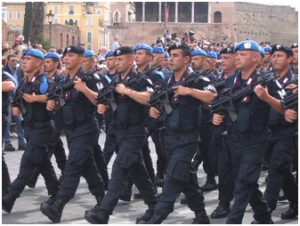
- The Corazzieri Regiment responsible for the escort and security of the President of the Republic and guard of the Quirinale Palace;
- Departments in Service to Constitutional Bodies such as the Presidency of the Republic, the Senate, Parliament, the Judiciary, the Prime Minister and the National Council of Economy and Labour;
- Carabinieri Departments which performs Military Police and security duties in favour of the Armed Forces in Italy and abroad;
- Carabinieri personnel attached to the offices of the military judiciary;
- Carabinieri personnel attached to the Ministry of the Interior – Department of Public Security in the following areas:
- Police Force Coordination and Planning Office;
- Criminal Police Headquarters;
- Anti-mafia Investigation Headquarters;
- Anti-drug Service Headquarters;
- The Italian interagency College of Advanced Studies for Law Enforcement Officials;
- Inter-force Personal Security Headquarters.
International Activities
International cooperation
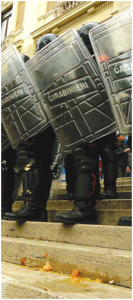 Over the past ten years the illicit activities of organized crime have become more concentrated on an international level, even by using the most advanced informatics and Telematics means (the so called “Cyber-crime”). Consequently, an efficient structure is required to deal with this situation.
Over the past ten years the illicit activities of organized crime have become more concentrated on an international level, even by using the most advanced informatics and Telematics means (the so called “Cyber-crime”). Consequently, an efficient structure is required to deal with this situation.
As such, the international community is working towards closer collaboration in order to fight the new threat of crime together using communal resources.
The Carabinieri Force has taken specific initiatives, following guidelines on cooperation from the Ministries of Defence and Internal Affairs, to collaborate in association with other national military and police organizations in exporting the national experiences and contributing in the organized crime fight, by individuating commons objectives and applying homogeneous operating procedures.
The exchange of information on personnel training and recruitment, organization and new technologies has been intensified with police forces and military organizations in other countries utilizing experience already gained in previous cooperation initiatives with the National Gendarmerie in France and the Civil Guard in Spain in 1994. This has resulted in the formalization of the FIEP Agreement (France, Italy, Spain and Portugal) involving, at the beginning, the French Gendarmerie, Spanish Civil Guard, Portuguese Republican National Guard, and after few years Turkish Gendarmerie, Dutch Koninklijke Marechaussee, Moroccan Gendarmerie, Romanian Gendarmerie and, as observer, the Argentinean Gendarmerie and the Chilean Carabineros.
At the same time, technical bilateral agreements were signed with the Rumenian Gendarmerie, the Internal Military Troops of the Ukraine, the Armed Forces of Qatar, the National Gendarmerie in Argentina and the Carabineros in Chile, with the objective of amplifying experience in the fields of training, formation, information technology, public relations and public relations.
With regard to international police cooperation, the Carabinieri Force has followed the guidelines as laid down by the Ministry of the Interior in Article 6, Act no. 1, letter g, of 1st April 1981, no.121.
As to international police cooperation, the course of action taken, has been directed principally towards the intensification in the exchange of information regarding emergent criminality, identification of the best operating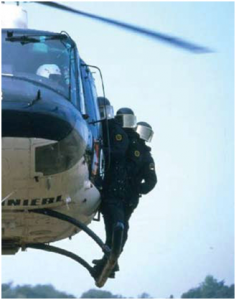 procedures, the spread of investigative experience with maximum effectiveness as well as research into the proposal to make national legislation uniform.
procedures, the spread of investigative experience with maximum effectiveness as well as research into the proposal to make national legislation uniform.
Officers of the Force are involved in G8 Groups, working groups as required by the Schengen Agreement for the development of “Acquis Communautaire” as well as in all the police cooperation activities of the Justice and Internal Affairs Third Pillar of the European Union. In this important sector Officers of the Carabinieri are employed as experts in the AWF (Analysis Work File) concerned with organized crime, illegal immigration from Eastern European countries and terrorism.
The Carabinieri Force, whom has personnel in several extra-European Union countries as liaison officers or as anti-drug experts, also participates in international cooperation through OIPC, (International Organization of Crime Police – Interpol) by attaching personnel to the Italian Police International Cooperation Service reporting to the Department of Public Security – Head Office of the Crime Unit.
Moreover, the Carabinieri participate to the OLAF (European Anti- Fraud Office) with an Assigned National Expert in the prevention and fight against Euro counterfeiting and within the ENFSI (European National Forensic Science Institute’s Work Groups). The Carabinieri Scientific Investigation Department contribute with other European forensic institutes in research and experimentation for the most modern techniques in scientific investigation.
Finally, the Carabinieri General Headquarters – International Cooperation Office, coordinates the participation of the Force Departments to the European Community programmes, co-financed by the European commission (ISEC, TWINNING and TAIEX). So far several initiatives, aimed at making possible for Carabinieri specialist Departments the implementation of international seminars and working groups within the European Union, have been taken.
Military missions abroad
Since 1855, the Carabinieri Force, has had a long tradition in its participation in humanitarian and peacekeeping duties abroad, and has taken an active role in the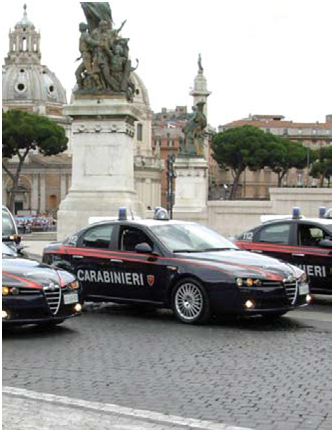 evolution of these operations by direct intervention in the most significant missions conducted by the United Nations, NATO, OSCE and in Multinational Forces agreements.
evolution of these operations by direct intervention in the most significant missions conducted by the United Nations, NATO, OSCE and in Multinational Forces agreements.
As well as the traditional military role, human rights, assistance and consultancy in the reconstruction of policing, the implementation of law and order duties have been carried out.
Particularly significant, in the sector of law and order, is the role being carried out in the Balkans by MSU (Multinational Specialised Unit) a part of the NATO mission designed to bridge the security gap between the military, whose troops are not equipped to deal with the problems of public order and safety, and the civilian police forces, either UN or local, untrained to intervene in public order operations. This capability of intervening in different situations, together with perfect interface with other military forces makes MSU an instrument not only useful in the NATO environment but also in any possible European Union operation. As a result of the experience gained by the Carabinieri MSU, the European Union has approved the institution of an Integrated Police Unit, which can be immediately deployed, flexible and interoperational with the military, to be used for humanitarian aid, peacekeeping and in natural disasters as laid down in the EU directive “Petersburg” after the meeting held there in June 1992.
Sport Activities
Sport is very important in the Carabinieri Force, not only because it is synonymous with military life, but also because it plays an important role in the fitness, culture and spirit of sacrifice associated with its members. Through the Carabinieri Sports Centre, the Force participates in national sporting competitions with top quality athletes.
The Carabinieri Sports Centre has 10 Sections spread around Italy, each of which specializes in a particular field:
- Selva di Val Gardena for winter sports;
- Bologna for athletics;
- Livorno for skydiving;
- Rome for equitation, marksmanship, judo, karate, fencing and pentathlon;
- Naples for swimming.
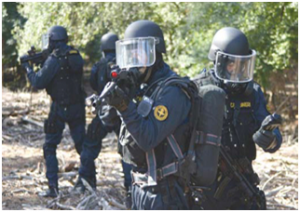 The Carabinieri Band
The Carabinieri Band
The Band was founded in 1820, when the Royal Carabinieri Corps assembled a group of buglers for the first time. This was then transformed, in 1862, into a fanfare and, by 1920, had further developed into a full Band contingent of the Carabinieri Force. Under the direction of Maestro Luigi Cajoli, the Band became famous for its quality of style and in 1916 it travelled abroad for the first time for a series of concerts for injured allied soldiers. It performed in Paris and was a great success and was highly acclaimed by the press. Then, later followed many other prestigious tours abroad in Europe, North and South America, the Middle East and Japan. Maestro Luigi Cirenei, who was a pupil of Pietro Mascagni, succeeded Cajoli in 1925. He improved the artistic skills of the Band and composed “LA FEDELISSIMA” the march theme adopted by the Carabinieri Force. The following, were Directors of the Band: Maestro Domenico Fantini (1947), Maestro Vincenzo Borgia (1972) and Maestro Massimo Martinelli (2001), who is the present Director. The Carabinieri Band, with 103 musicians, each one expert in a particular instrument, interpret the most famous compositions with a rich repertoire from traditional military marches to modern and classical music.
Role Of Honour
Loyalty to the institutions, morality and civil conscience have always been identified with the image of the Carabinieri Force. As an acknowledgement of values, devotion and generosity demonstrated in every circumstance by the Carabinieri Force, since 1864 Parliament has conferred the Institution with the title of “Benemerita”: “The reason why everyone is interested in the ongoing improvement of the Carabinieri Force depends on the esteem of the public and on its distinguished and vital contribution resulting in a truly MERITORIUS Institution for the country”. (Parliamentary speech of 24th June, 1864). In more than 195 years of institutional activity in war and peace by the Meritorious Force, the many episodes of individual bravery, proof of the consistent sense of duty which has always inspired the Carabinieri actions, constitutes the tradition of the Force. After those killed in the Risorgimento campaigns, the First and Second World Wars, in the Resistance and in the enduring fight against crime, Carabinieri were involved in a long series of acts of bravery in defence of the State and the public.
The website: www.carabinieri.it



